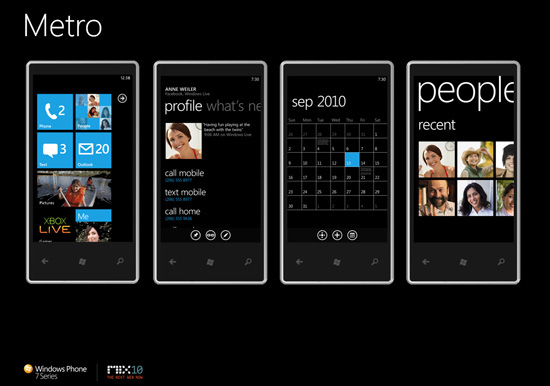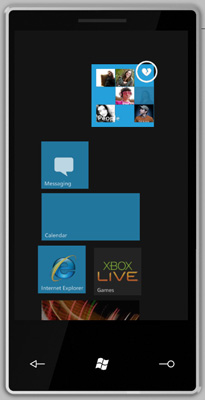Windows Phone 7: The AnandTech Guide
by Brian Klug on March 21, 2010 12:00 AM EST- Posted in
- Smartphones
- Windows Phone 7
- Mobile
Recapitulation
Microsoft MIX 2010 has drawn to a close, and with it comes our concluding wrap-up of everything that there is to discuss about Windows Phone 7 Series (henceforth WP7S).
Let's start at the beginning - WP7S does away completely with everything Windows Mobile. That means Windows Mobile applications won't run on WP7S, hardware running Windows Mobile won't run WP7S (including HTC's HD2), and Windows Mobile is no longer being actively developed. Existing hardware will get support for corporate clients, and the developer tools will remain, but they won't be actively developed. Consider Windows Mobile officially banished from the Microsoft kingdom, and you get the perspective. To give you an example of just how banished Windows Mobile is, there was virtually no discussion of porting applications from Windows Mobile to WP7S - this is a completely different platform. Microsoft wants developers to forget about Windows Mobile and immediately start thinking WP7S. The sense of urgency is because Windows Phone 7 Series will ship before the end of the year ("Holiday 2010").
Microsoft has tossed out the Windows CE-derived, aging UI of Windows Mobile. In its place, it has created a typographically-driven "user experience" that takes taken nods from Windows Media Center, the Xbox Dashboard, Zune HD interface, and urban signage. It calls this style "metro."

Metro - "It's about content and typography"
Instead of standalone application icons, WP7S uses "tiles." In practice, these are almost the same thing, except developers can both change the icon and dominant text to notify the user at-a-glance of status changes or updates. Tiles are supposed to be animated and dynamic. Tiles then launch into sessions and pages. The user interface bleeds off the sides - Microsoft wants people to navigate right to left across a page, teasing the user with elements from neighboring sections. Tiles are rearranged on start page much the same way they are on iPhone OS - pressing and holding levitates a tile, from which point you can either delete the tile (by clicking a broken heart) or drag and rearrange.

Tiles have feelings too...
Optionally, you can launch applications from a comprehensive list view as well.
The UI can be loosely customized, but right now it boils down to four different "accent" colors - which are the tile and UI highlighting colors - and "light" or "dark" for an either black text on white, or white text on black experience. Part of this customization is to leverage the battery-saving properties of AMOLED screens which consume far less power with white text on a black background.
Next are what Microsoft is calling "hubs." These are usually double-wide tiles, and serve as sort of an application for organizing your applications. For example, instead of having a lot of standalone applications which edit or modify photos spread throughout the launcher, you can optionally also launch them through the photo hub right alongside where you view pictures. Another example would be the way apps like Last.fm can themselves be launched from within the music + video hub, right alongside your Zune collection and play history. So far, there are hubs for people, pictures, office, music + video (Zune), marketplace, and games.

Note "apps" to the right. Microsoft is hip.
What each of the hubs do is pretty self explanatory. People is where you'll find all your exchange and local contacts, Pictures is for albums and slideshows, Office includes Excel, Word, and OneNote documents, and Music + Video bundles Zune music and videos alongside other media on WP7S. Marketplace is WP7S' take on an application store, and Games has tight integration with Microsoft's cloud services, including Xbox LIVE. More on that later.
















55 Comments
View All Comments
nerdtalker - Sunday, March 21, 2010 - link
Noted and fixed! Thanks!Cheers,
-Brian
StormyParis - Sunday, March 21, 2010 - link
It seems so close to the whole iPhone thing, that if I were MS I'd be embarassed... a lot of pride swallowing must have been going on.My issue is, I can't find a good reason to want these phones. Even Office integration doesn't cut it, because the hardware is so gimped that I'd never, ever, want to do any office work with it. The rest is just regular smartphone stuff. As with Apple, I lose a whole lot of freedom of features (forced to use IE ? IE ??? back to web 0.8, guys). And my personnal guess would be that for the same loss, I get less in exchange, in terms of ease of use and features.
Hopefully Google and Nokia will manage to keep their ecosystems open, because those "censored apps, censored hardware, no extensions nor upgrades" e-dystopias have me worried and slightly despondent.
NJoy - Sunday, March 21, 2010 - link
avid user of WM for last 5 years, now I'm so disappointed, it's even depressing. They just have killed everything what I liked about WinMo. SadCSMR - Sunday, March 21, 2010 - link
Extremely disappointing to be given a locked down system from Microsoft, missing essential capability that's been around for over a decade.Instead of continually expanding features and technology, and providing a better user interface, we have a locked down system with a long list of basic missing features. Windows Mobile has been downgraded from an operating system to firmware with this release.
Even the user interface, supposedly "stylish" is almost everywhere an inefficient use of space to present information. It's fine to pander to customers who want that... but now there's no way to customize it to something better.
Other features removed: No microSD cards, incredible! No file system access! Anyone who understands what a file is should avoid this system.
I can see the benefits for the computer-illiterate, but for us and for business users why not make an open "Windows Mobile 7 Business" version without the limitations?
wolrah - Sunday, March 21, 2010 - link
The carriers need the shiny new phones to attract customers, not the other way around. The consumer cares more about the thing they're carrying rather than the network it's on (see iPhone and AT&T). With that in mind, the experience of a mobile phone OS should be about the user, not the carrier.The ability for carriers to screw with phones is almost universally a bad thing. The CDMA carriers' love of BREW on dumbphones, Verizon's obsession with crippling devices, AT&T's lockdown of the Backflip and the previous heavy limits on "bandwidth intense" iPhone apps, etc. I don't think I need to go on to show that the carriers should never be allowed to influence phones in the slightest. I can not come up with a single example where carrier modifications were a benefit for the end user even on dumbphones, much less on smartphones.
The bit about appeasing carriers worried about becoming "dumb pipes" is the problem in a nutshell. They are dumb pipes, that's the point. They provide the spectrum and backhaul lines that connect my phone to the PSTN and Internet. Saying that telecom carriers don't want to be dumb pipes is like saying that Ford doesn't want to be a car company. It just doesn't make sense, since that's exactly what they are.
trochevs - Sunday, March 21, 2010 - link
I agree with you. Unfortunately we have two serious obstacles here. First is the brainwashed US consumer who thinks he/she is getting better deal by getting locked phone from US carrier for free or discounted price from artificially inflated price of unlocked phone.The US consumer are scripted so well and never stop to think for a minute. Just notice poor sales figures in USA for unlocked phones from Nokia, Sony and Google are.
Second is the monopolistic behavior of US carriers. For many years they did not allowed unlocked phones on their networks. Only when real threat of regulation become evident they start allowing it. But they pile your phone bill with extra fees that makes you think twice. Not only that, but they keep charge you exact same monthly service fee even when everyone knows that this fee includes the price of the phone.
anactoraaron - Sunday, March 21, 2010 - link
not to mention the monopolistic reality of government agencies allowing these carriers to buy out all of the smaller, local companies. There is this trend of broken economics going on here and we, the "end users," are the ones paying for it (literally). Once where I live here there were 4 smaller companies my "unlocked" phone would work on.... now "unlocked" phones are almost all just ATT and T Mobile.trochevs - Sunday, March 21, 2010 - link
Well. Thanks Brian for great article and thanks AnandTech for great coverage of Windows Phone 7 so far.From what I see WP7 is targeted directly against Apple iPhone not Google's Android. Apple is attacking HTC to hurt Android, but looks like Steve jobs did not learn his lesson. The real hit will come from Microsoft again. MS is taking advantage that all mobile operators are not happy with Apple keeping iPhone away from them. It will be slow switch for many iPhone users, but MS has the financial power to keep the WP7 alive for a while.
Google's Android has own problem now. Google compromised their relationship with open source community in order to meet the US mobile operators and handset manufactures demands, but now Android is facing the real possibility that US carriers are going to use Android as bargaining power to get better deal from MS. Just like Asus and other OEM did with early versions of netbooks and using have-baked Linux distributions. So Google needs to decide between Open Source community or discontinue Android in the long run and accept that US carriers will hold the key and can lock out Google if they want to.
So the key would be. How well Mr. Jobs and Mr. Schmidt have learn the lessons form recent and not so recent past. It will be fun watching. And the key player could turn to be Intel with their MeeGo.
FITCamaro - Sunday, March 21, 2010 - link
They're definitely going to have to allow applications like Pandora to run in the background or no one will buy the phone. I use Pandora on my Droid. If it killed Pandora any time I wanted to check my email, send a text message, or browse the web, I'd be be pissed.DigitalFreak - Sunday, March 21, 2010 - link
Unfortunately, it looks like they're going down the iPhone route and locking everything down. App store, no SD cards, etc. Really not surprising I guess when you look at how they handled the Xbox 360.